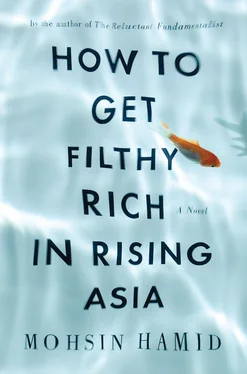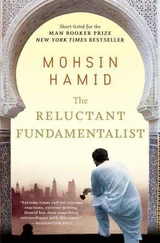You too are thinking of a woman as you approach the intersection, recalling the imaginary games you once played with your sister. In front of you a truck is hauling a shipping container, and its brakes start to hiss as it decelerates. Amidst this noise you see the gunman striding towards you, and you turn to your guard, but he has already understood. Your guard shoots thrice through your windscreen. The gunman falls. You are ready to flee but your guard opens his door and steps out onto the street. One of the bullets has dislodged a curly-haired piece of cranium. It rests not far from where the gunman lies, struggling to breathe. Your guard fires several rounds into his face and chest and snaps a photo with his mobile phone. Reoccupying his seat, he tells you to drive, and when you do not seem to understand, he repeats himself, and you quickly obey.
You stop on a deserted road and your guard uses the socket wrench from your tire-change kit to smash your damaged windscreen, cracking it like an eggshell. He pushes it free from inside the car, employing both feet, and carries it to a pile of rubbish. A humid breeze ruffles your collar as you continue home, and that night you lie with your revolver under your bed, unable to sleep. You wonder what will happen now, if you will suffer violent retribution, a prospect made much more concrete by your vivid recollections of the gunman’s slaying.
But you are subsequently informed by the faction head that the photo has been transmitted, along with a written communication, to the businessman, and a cessation of his threats against you has been agreed upon. You do not know whether entirely to believe this, whether some larger scheme is instead playing itself out, but your guard is taken away, and so you recommence after months to move about alone, hoping for the best, and also putting your affairs in order, in case you are mistaken.
Your business prospers, and soon the entire incident becomes, if not a distant memory, at least not a pressing concern. You work long hours, returning late to your wife, and focus on your immediate tasks. You think from time to time about the pretty girl, and she thinks about you, but she does not communicate, holding back whenever she feels the impulse to do so, not wanting to interfere in your happiness with your wife, and you do the same, and for the same reason. But even unconnected in this way, the pretty girl does interfere, for you are unable to open yourself to your wife fully, seeing reminders of the pretty girl in her, as though the pretty girl has become your archetypal woman, of which your wife can only be a copy, and hearing in your wife’s laughter and feeling between your wife’s legs echoes of the pretty girl, painful echoes that cause you to shut yourself off and keep away.
You try to compensate materially, buying your wife an expensive necklace, nothing when compared to those worn by heiresses and celebrities, of course, but still of a modest splendor neither she nor you has previously possessed, and this gift pleases her, but her hope that your gesture will be accompanied by the genuine tenderness she craves soon fades, and the necklace stays in its box, unworn, on all but the odd night or two a year.
Increasingly, your wife comes to find herself unsettled by the attention she receives from many young men at her university, and by her own desire sometimes to respond, always quickly repressed since she has been raised to believe in the inviolability of marriage, and so she starts to dress more modestly, and even to cover her hair when she leaves the house, establishing thereby a barrier between her and the covetousness around her, and a degree of inner calm.
Lying beside her in your bed, untouching, a newly installed little generator rumbling downstairs as it shields you both from electrical outages, and your head on a towel because age and postural problems have combined to give you a recurring stiffness of the neck, it does not occur to you that your wife’s love might be slipping from your grasp, or that, once it is gone, you will miss it.
EIGHT
BEFRIEND A BUREAUCRAT

NO SELF-HELP BOOK CAN BE COMPLETE WITHOUT taking into account our relationship with the state. For if there were a cosmic list of things that unite us, reader and writer, visible as it scrolled up and into the distance, like the introduction to some epic science-fiction film, then shining brightly on that list would be the fact that we exist in a financial universe that is subject to massive gravitational pulls from states. States tug at us. States bend us. And, tirelessly, states seek to determine our orbits.
You might therefore assume that the most reliable path to becoming filthy rich is to activate your faster-than-light marketing drive and leap into business nebulas as remote as possible from the state’s imperial economic grip. But you would be wrong. Entrepreneurship in the barbaric wastes furthest from state power is a fraught endeavor, a constant battle, a case of kill or be killed, with little guarantee of success.
No, harnessing the state’s might for personal gain is a much more sensible approach. Two related categories of actor have long understood this. Bureaucrats, who wear state uniforms while secretly backing their private interests. And bankers, who wear private uniforms while secretly being backed by the state. You will need the help of both. But in rising Asia, where bureaucrats lead, bankers tend to follow, and so it is on befriending the right bureaucrat that your continued success critically depends.
You sit before him now, in his government office, spacious yet dowdy, as such offices often are, with dusty windows, framed portraits of a pair of national leaders, one dead and one alive, and chunky wooden seating in need of reupholstery, which, if reconfigured, could easily accommodate twice as many visitors, and communicates through its weightily inefficient refusal to do so a loud and clear signal of intent. Many bribes were paid to enable this meeting, most importantly to the bureaucrat’s personal secretary, without whose assent slots in his calendar seem never to open up, and so here you are, with the head honcho himself, finally able to make your pitch.
The bureaucrat, in violation of nonsmoking regulations, lights an exquisitely expensive gifted cigar from his well-appointed humidor without offering you anything but a cup of tea. He knows your type, self-made, on the rise, and because of his education, family background, and temperament he regards you with disdain, but also with satisfaction, for there is usually more money to be had from supplicants who seek to challenge the status quo than from those who seek merely to maintain it.
You were delivered to him by a sticky web of red tape. Permits denied, inspections failed, meters improperly read, audits initiated, all these scams and hassles you have over the years surmounted by greasing junior and mid-level palms. But you have reached an impasse. Your firm has become fairly aboveboard, at least as far as product is concerned, sterilizing mostly to the accepted standard and bottling under your own name. Yet your expansion into the big leagues, into the mass market of the piped municipal water game, has been stymied. Only state-licensed providers can bid for municipal contracts, and your application for such a license has been turned down. So you have pursued the rejection to its source, this man seated in front of you.
He puffs away, the fingertips of his free hand resting on a file containing your recently dismissed proposal. You drone on about the technical soundness of your candidacy, your capital and expertise, your many satisfied customers. The bureaucrat lets you expend your energy, punch yourself out, presentationally, and when you inevitably fall silent he writes two words on a sheet of paper in the indigo ink of his gold-nibbed fountain pen and pushes them towards you. They are, “How much?”
Читать дальше













